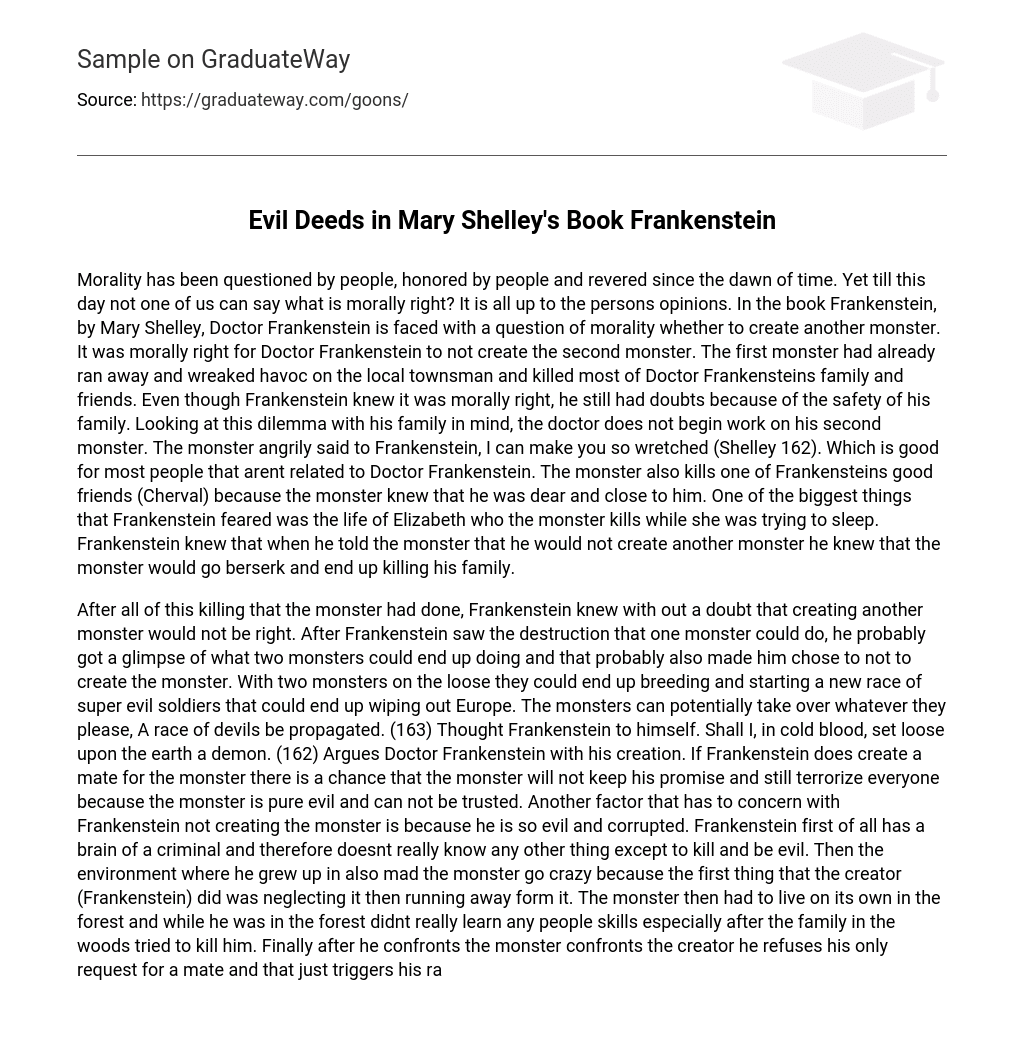Throughout history, the concept of morality has been debated, regarded, and revered. However, there is still uncertainty regarding what constitutes moral correctness. Ultimately, it is subjective and dependent on individual perspectives. In Mary Shelley’s book, Frankenstein, the protagonist, Doctor Frankenstein, faces a moral dilemma – whether or not to create a second monster. From a moral standpoint, it was the right decision for Doctor Frankenstein to refrain from creating another monster. The initial creature had already escaped and caused chaos in the townspeople’s lives, resulting in the death of most of Doctor Frankenstein’s loved ones. Despite understanding the moral imperative, Frankenstein had reservations due to concerns for his family’s safety.
Considering his family, the doctor refrains from working on his second monster (Shelley 162). Expressing anger towards Frankenstein, the monster states, “I can make you so wretched.” This is beneficial for those unrelated to Doctor Frankenstein. Additionally, the monster murders Cherval, one of Frankenstein’s close friends. Frankenstein’s greatest fear is the safety of Elizabeth, whom the monster kills while she sleeps. Knowing that refusing to create another monster would enrage the creature, Frankenstein anticipates the monster’s rampage and the subsequent destruction of his family.
After witnessing the monster’s immense killing spree, Frankenstein became certain that creating another monster would be morally wrong. The destructive power exhibited by a single monster gave Frankenstein a glimpse into the potential chaos that two monsters could unleash. It is likely that this realization influenced his decision against creating a second monster. Frankenstein understood that if two monsters were set loose, they could potentially reproduce and create a new race of incredibly evil soldiers, capable of wiping out Europe. The monsters had the potential to conquer any territory they desired, ultimately resulting in a propagation of devilish beings. (163) Frankenstein pondered to himself.
Doctor Frankenstein debates whether or not he should release a demon onto the world. He fears that if he creates a companion for the monster, the monster may break his promise and continue to terrorize others, as he is inherently malicious and deceitful. Additionally, Frankenstein is troubled by the fact that the monster is corrupt and thoroughly evil. The monster possesses the mind of a criminal and lacks the capacity for anything other than killing and malevolence.
The monster’s environment during his formative years also had a detrimental effect on his mental state. The first action taken by his creator, Frankenstein, was to neglect him and then flee. This forced the monster to fend for himself in the forest, where he did not acquire any social skills. His isolation was further exacerbated when a family in the woods attempted to kill him. The monster’s anger reached its boiling point when his request for a companion was denied by his creator. These chain of events ultimately resulted in the creation of a monstrous being, and the potential arrival of another such monster would bring utter chaos to the world.
Frankenstein was greatly troubled by the decision of whether or not to create a second monster, which may have contributed to his temporary insanity. Despite his initial intentions of benefiting humanity, his experiment ultimately caused harm to himself and his loved ones. However, in order to do what was best for humanity, Frankenstein chose not to bring the second monster into existence and thereby rescued the world (in the context of the book). Although the monster did commit numerous murders, much of the responsibility falls on Frankenstein himself for creating an environment in which the monster could develop in that manner.





